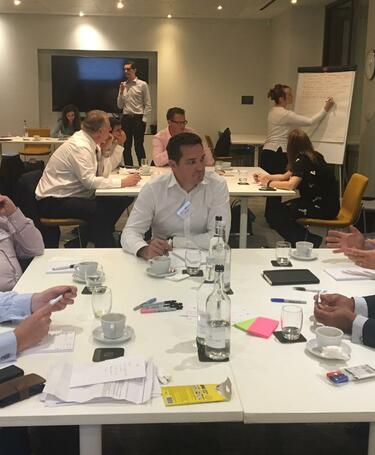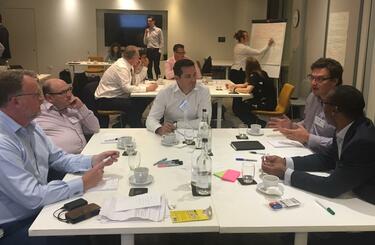
Developing, challenging and engaging quality talent
Progress indicator

The sixth Corporate Connect event of the year, saw participants exploring how industry can work with higher education to fill the quality skills gap
How to engage quality professionals and develop their skills was the topic for the CQI’s sixth Corporate Connect event of the year, ‘Wider Horizons – Developing, Challenging and Engaging Quality Talent’.
In his opening remarks at the event, which took place on 11 October at the Clubhouse St. James, London, CQI’s CEO Vincent Desmond said that one of the most prominent issues organisations are facing today is the difficulty in retaining quality talent. “When the CQI conducted its Workforce Survey earlier this year, the quality profession ranked higher in job satisfaction than human resources, engineers, teachers and doctors. This is good news because it shows that quality professionals seem to enjoy their job,” he said. However, the challenge now is to bring and retain people in the profession, said Desmond, adding that the CQI wants to help organisations fill the quality skills gap.
Dr Barbara Savage, HPE Client Manager and Course Leader at the University of Portsmouth, Paul Maguire, former Director for Quality at Hewlett Packard Enterprise, and Sampath Sreevathsan, Lean Six Sigma Lead for the EMEA region at Hewlett Packard Enterprise, were the speakers for the day. During the event they explored how to provide future quality leaders with more strategic capabilities, and how organisations can capitalise on opportunities to capture and transfer value from academic research in quality and access industry best practices. They also focused on how to develop a robust quality career path and promote talent engagement and retention of quality professionals.
Sreevathsan held a presentation on how his organisation worked with the University of Portsmouth to fill the quality skills gap. Speaking to CQI’s Content Executive Alicia Dimas after the event, he said the key learnings he would like attendees to take home from the event are how to align employees to key strategic priorities, how to develop employees’ skills, and the role universities can play in the development of these skills.
One of the main signs of a weak quality culture in an organisation, is that “people are focused on numbers, revenue, and they forget the fact that they need to establish a quality culture within the company,” said Sreevathsan.
“If organisations don’t invest upfront to prevent defects, the cost of rectifying those defects will be much higher later on. We need to ensure we have a good quality culture, that our employees’ skills are enhanced so that they are thinking how they can improve what they do every day.”
According to Sreevathsan, the successful leader of the future will focus on aligning strategic priorities of the organisation to employee goals, “Encourage employee engagement and development to retain the best employees in the organisation to deliver growth and thereby increased revenue”.
Dr Barbara Savage, from the University of Portsmouth, spoke about the university’s MSc Strategic Quality Management degree, its structure, the advantages it can bring to quality professionals, and how it incorporates Lean Sigma Black Belt training.
“Academic learning can have a key impact on transferable knowledge and skills for quality specialists, so that they can actually improve their impact on businesses,” she said.
During her presentation, Savage explained the value of having students from diverse backgrounds attending the degree. Speaking after the event, she said there are many benefits for businesses that have a diverse workforce too, particularly in quality. “If you have people with different backgrounds, coming from the public or private sectors, with diverse technical knowledge, different nationalities and cultures, it causes you to reflect on why you do things the way you do.”
She concluded by stating that “an open and inquiring mind, to accept unlikely opportunities, will be the most important characteristic for the quality professionals of tomorrow.”
Spencer Hollands, Project Quality Manager for Flour, who attended the event, said he realised different companies from different backgrounds have the same challenges. He said he hopes what he learnt during the event can be put into practice in his organisation and that the CQI might play an important role in supporting this.
“Everyone has the same challenges, and everyone is looking for solutions and answers to these challenges. The networking part of the event allows us to share ideas that we can implement in our own organisation, learning lessons from the successes and failures of other people,” he concluded.
Quality World

Get the latest news, interviews and features on quality in our industry leading magazine.


